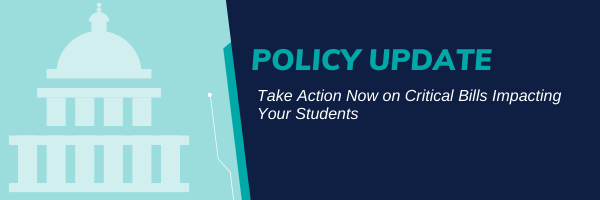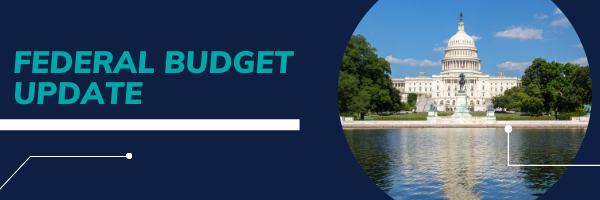In this Issue:
- Assembly Budget Subcommittee Hears Community College Budget
- Take Action Now on Critical Bills Impacting Your Students
- Joint CCC Advocacy Efforts
- Federal Budget Update
- Don’t Miss these Sessions at the Annual Trustees Conference
- Advocating for Black Student Success
- Join Us for our Next GR Webinar: Tuesday, May 17
- Federal Grant Opportunities
Assembly Budget Subcommittee Hears Community College Budget
On April 5th, the Assembly Budget Subcommittee #2 on Education Finance took up the major funding items for the California Community Colleges in the Governor’s January Budget proposal. While the Subcommittee did not take any votes at the hearing, its major emphases were on:
- COLA
- Funding Formula
- Calbright
- Deferred Maintenance
- Part-Time Faculty Health Insurance
During public comment, The League’s Director of Government Relations, Andrew Martinez, testified in support of a $300 million increase to base apportionment, buy-down of districts’ escalating pension obligations, and financial aid reform. Both Martinez and Sierra College Superintendent/President Willy Duncan urged the Subcommittee to change the base year of the current Student Centered Funding Formula Hold Harmless provision from 2017-18 to 2021-22.
On April 19th, the Subcommittee held an additional hearing on affordable housing and other miscellaneous items in the community college budget.
Despite the multitude of items, the predominant discussion was on housing with presentations by students, the Department of Finance, the Legislative Analyst’s Office, and representatives of the three segments. Subcommittee members were specifically interested in whether the decisions on state housing dollars that were agreed to last year by the Administration and Legislature should be continued. Questions were raised on the use of public-private partnerships and other legislative approaches, like AB 1602 (McCarty), which creates a revolving loan fund for the three public segments.
In written testimony, the League urged the Subcommittee to approve all projects recommended by the Department of Finance and recommended using funds subject to the State Appropriation Limit (SAL) to pay for additional housing projects, consistent with the letter written by the Community College Facility Coalition.
The Subcommittee did not take any votes at the hearing and left the item open for later actions.
Take Action Now on Critical Bills Impacting Your Students
Every year, the Legislature introduces several bills that significantly impact the ability of your institutions to educate your students. These bills range from legislation that would support low-income students to bills that would restrict your ability to meet your local needs and priorities. Information on the bills can be found below.
AB 1505 (Rodriguez) Full Time Faculty - OPPOSE
Would artificially set the minimum amount of full-time faculty members a district must hire regardless of the status of enrollment or changes in educational services relating to the pandemic.
AB 1752 (Santiago) Part-Time Faculty - OPPOSE
Would require that part-time faculty members are paid equal compensation to their full-time counterparts without regard to the resources to pay for costs.
AB 1746 (Medina) Cal Grant Reform - SUPPORT
Would overhaul the state’s current Cal Grant program by streamlining and consolidating the existing programs into a Cal Grant 2 Program for community college students and a Cal Grant 4 Program for students attending four-year colleges. Would remove the GPA, age, and time-out-of-high-school Cal Grant eligibility requirements for community college students.
Visit the League’s website for template letters and more information on these bills. We encourage colleges to take action now on AB 1505, AB 1752, and AB 1746 using our resource page.
Joint CCC Advocacy Efforts
On March 30th, the League sent a letter to Governor Newsom urging the approval of the Wyse plan to help colleges address enrollment challenges to buy-down our districts’ escalating pension obligations and a $300 million technology increase to base apportionment, the first in several investments to increase the base above COLA to achieve educational equity.
This letter includes the signatures of 76 California Community College chancellors, superintendent/presidents, and college presidents. Thank you to those that signed the letter and joined us in our advocacy efforts. Click here to read the letter.
Federal Budget Update
FY 2022 Omnibus Appropriations Act
The FY 2022 Omnibus Appropriations Act signed into law by President Biden on March 15, 2022, includes $730 billion in non-defense funding and $782 billion in defense funding. The following are highlights:
U.S. Department of Education
- $3 billion for higher education programs, an increase of $452 million above the previous enacted level
- $1.14 billion for Federal TRIO programs, an increase of $40 million
- $378 million for GEAR UP, an increase of $10 million
- $59 million for Teacher Quality Partnerships, an increase of $7 million
- $65 million for the Child Care Access Means Parents in School, an increase of $10 million
- $6,895 for the maximum Pell Grant, an increase of $400
U.S. Department of Labor
- $2.9 billion for Workforce Innovation and Opportunity Act (WIOA) State Grants, an increase of $34 million
- $235 million for Registered Apprenticeships, an increase of $50 million
- $50 million for Strengthening Community College Training Grants, an increase of $5 million
Congressionally Directed Spending (earmarks)
- ACCT reported $249.4 million enacted for community college earmarks nationwide
- California community colleges approved for FY 2022 earmarks include College of the Canyons, Lake Tahoe CC, Los Angeles CCD, Peralta CCD, Riverside CCD, San Diego CCD, and South Orange County CCD
President’s Fiscal Year 2023 Budget
Below are highlights of the President’s FY 2023 Budget sent to Congress on March 28, 2022:
U.S. Department of Education
- $20.5 billion for Title I grants to schools
- $18.1 billion for special education
- $752 million increase for minority-serving institutions (MSI) and community college
- $2,175 increase in the maximum Pell Grant
U.S. Department of Labor
- $11.1 billion for the Employment and Training Administration
- $3.7 billion for WIOA and Employment Service grants, a $203 million increase
- $303 million for apprenticeship programs, an increase of $118 million
Federal Legislation of Interest
Workforce Innovation and Opportunity Act (WIOA) Reauthorization
As passed by the House Education and Labor Committee
- Authorizes Strengthening Community College Training Grants, and doubles funding for these grants to $100 million in FY 2023, increasing to $161 million in FY 2028
- Increases the number of community college representatives on the state workforce board and requires community colleges to be included in workforce development plans
America COMPETES Act of 2022
Now in House-Senate Conference Committee
- Moving toward a doubling of the budget for the National Science Foundation Advanced Technological Education (ATE) program – from $75 million to $150 million/year
Hispanic Educational Resources and Empowerment Act (“HERE Act”)
Recently introduced by Senator Alex Padilla (D-CA) and Rep. Joaquin Castro (D-TX-20)
- Addresses the gap in college attendance and completion rates for Latino students by authorizing $150 million annually for a Department of Education program to support Hispanic Serving Institution (HSI) collaboration with school districts
- Authorizes grants and technical assistance to federally designated HSIs to expand collaboration with high schools to better serve Latino students
Don’t Miss these Sessions at the Annual Trustees Conference
The Annual Trustees Conference will be held April 29-May 1, in Southern California. During the conference, trustees from across the state will have the opportunity to hear from presenters on critical issues of importance to California’s community colleges. Of the numerous sessions that will be presented, we would like to highlight and ask you to attend the following five sessions as they relate to our advocacy work in Sacramento.
Saturday, April 30, 8:00 a.m. – 9:30 a.m.
The 2022-23 State Budget and Its Impact on Our Future
The Governor will be releasing his updated budget plan in the coming weeks. That proposal, the May Revision, will be significant for our colleges. While revenues may be higher, there is a great deal of uncertainty as it relates to enrollment and our economy. What should Trustees be thinking about when it comes to the budget and the near future?
Saturday, April 30, 9:45 a.m. – 10:45 a.m.
Advocating for your Students: A Trustees Role in the Legislative Process
Trustees play a critical role in advocacy. State and federal policymakers depend on you and your district staff to provide your district's perspective on relevant bills or budget proposals. This session will focus on how trustees can best support advocacy efforts.
Saturday, April 30, 9:45 a.m. – 10:45 a.m.
Addressing Food Insecurity in California Community Colleges
Every day, community college students across the state face some form of food insecurity. This session will highlight a recent Food Insecurity Report produced by the Community College League's Affordability, Food, and Housing Taskforce.
Saturday, April 30, 11:00 a.m. – 12:00 p.m.
Student Mental Health: What a Trustee Needs to Know
Now – more than ever – our students face a complex mix of issues relating to student mental health. This session will focus on the tools available to your district and how you can best support practitioners at your institution.
Saturday, April 30, 2:15 p.m. – 3:30 p.m.
Redistricting and the Legislature
How will the recently completed redistricting process impact Sacramento and local districts, including the community college districts, what should community college advocates and trustees know about this year, the coming election cycle?
Advocating for Black Student Success
This week (April 25-29th) is Black Student Success Week. This year’s theme is A Vision for Black Student Success: Creating a New Landscape to Succeed. The 2022 Black Student Success Week will focus on new approaches to ensure Black and African American students succeed at California Community Colleges as we recover from the COVID-19 pandemic.
The week’s activities will be held virtually via Zoom and include:
- The Black Hour: daily webinars from 12:00 – 1:00 p.m.
- The After Party: daily group discussion forums from 1:30 – 2:30 p.m.
- BlackOut Advocacy Day: Thursday, April 28, 8:00 a.m. – 4:00 p.m.
To register for the remaining webinars this week, visit https://linktr.ee/cablackstudents
We hope you will join us in our joint advocacy efforts for Black Student Success Week by advocating for the following priorities. To download the advocacy day one-pager, click here.
- INCREASE COLLEGE AFFORDABILITY FOR BLACK STUDENTS
California Community College students face the highest cost of attendance and greatest need for financial aid support. State leaders must prioritize providing financial support for our neediest students in an intentional and racially equitable way.
- INTENTIONALLY FUND BLACK STUDENT SUCCESS
The state should provide funding to each community college for Black student outreach, support, and retention efforts. Colleges and universities must make their campuses student ready and implement innovative best practices that promote re-enrollment and student retention, without appropriate funding, this goal cannot be met.
- MAKE INTENTIONAL SPACE FOR BLACK STUDENTS TO THRIVE AT CALIFORNIA COLLEGES AND UNIVERSITIES
California cannot make progress toward an ambitious 70 percent degree attainment goal if we do not provide the space for Black students on college and university campuses. We must increase focus on access for CSU and UC eligible Black students to their California college or university of choice, while also supporting community colleges in preparing students to transfer to four-year universities.
Join Us for our Next GR Webinar: Tuesday, May 17! Join the League's Government Relations Team for our monthly webinars. Receive important information regarding legislation and proposals discussed in Sacramento and Washington, D.C. that will impact you, your students, and your institution.
2022 Webinar Schedule
January to October: Every third Tuesday of the month, 11:00 a.m. - 12:00 p.m.
Tuesday, May 17, 11:00 a.m.
Tuesday, June 21, 11:00 a.m.
Tuesday, July 19, 11:00 a.m.
Tuesday, August 16, 11:00 a.m.
Tuesday, September 20, 11:00 a.m.
Tuesday, October 18, 11:00 a.m.
Webinar Details
Telephone Number: (646) 876-9923 or (669) 900-6833
Meeting ID: 623 780 059
Password: 110660
Registration
Be sure to register in advance for this meeting. After registering, you will receive a confirmation email with information about joining the webinar.
Federal Grant Opportunities
Presented by Downs Government Affairs
The League, in partnership with Downs Government Affairs, provides a list of federal grants to assist your community college in improving its programs and services. For a full list of federal grants available to community colleges, visit our Federal Grants page at www.ccleague.org/federal-grant-opportunities.
If you have any questions, please feel free to reach out to Thomas Downs at TCDowns@downsgovaffairs.com.
Upcoming Events
Black Student Success Week
Daily Webinars, April 25-29 12:00 – 1:00 p.m.
Annual Trustees Conference
April 29 - May 1 | Laguna Cliffs Marriott, Dana Point
CCC LGBTQ+ Summit
May 4-5 | Virtual Event
2022 ACBO Spring Conference
May 16-18 | Resort at Squaw Creek, Lake Tahoe
Consultation Council
May 19 | Zoom
Board of Governors Meeting
May 23 | Zoom
For more information, contact the League's Government Relations and Communications staff: advocacy@ccleague.org
Follow League Tracked Bills at www.ccleague.org/advocacy/bill-tracking
For news related to the State Budget and Policy visit www.ccleague.org/advocacy














